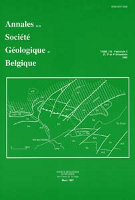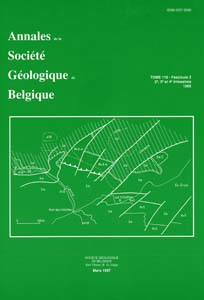- Portada
- Volume 108 (1985)
- Volume complet
- Réflexions sur la protection des aquifères karstiques et sur des activités humaines génératrices de karsts accélérés. Les exemples du Tournaisis et de la Gileppe
Vista(s): 664 (3 ULiège)
Descargar(s): 379 (2 ULiège)
Réflexions sur la protection des aquifères karstiques et sur des activités humaines génératrices de karsts accélérés. Les exemples du Tournaisis et de la Gileppe

Abstract
On the protection of karst water resources and on man-accelerated karst development. The cases of the Tournai area and the Gileppe river.
Among the direct effects of karstification on water resources, the creation of circulation channels is a classical example. The pollution by induced infiltration of a polluted river is a less classical consequence of karst. The case of infiltration of polluted water of the Scheldt river in the Carboniferous Limestone aquifer is analysed and three types of pollution can be distinguished by study of the chemical changes of water and modelisation.
In this study of the pollution of the carboniferous aquifer by infiltration of surface water, a dispersion model was able to explain and simulate the dispersion of Scheldt water into the aquifer.
But the most important contribution was the discovery of an induced pollution resulting from the interaction between the upwelling waters of the aquifer and some local concentrations of sulfides and associated oxides and hydroxides in the limestone. These consequences of the raise of the aquifer caused by the infiltration could be more dangerous than the dispersion of the polluants. In fact, the chemical reactions produced contamination of water by Fe, Zn and SO4 but also induced an accelerated karstification of the limestone as shown in the equilibrium diagrams. This example is a case history of induced chemical pollution. At last, two local pollutions were detected. The origin of one could be attributed to percolation of locally polluted water from an overlaying aquifer, while the other was caused by a discharge of sewage water.
An example of indirect consequences of karstification on surface water production is given. The discovery of karst holes in the underground of the area chosen for the building of the water-treatment plant is described. It caused the displacement of the installations.
Para citar este artículo
Acerca de: Ernest Laurent
Ministère de la Région bruxelloise, 6, rue Royale, 1000 Bruxelles.






